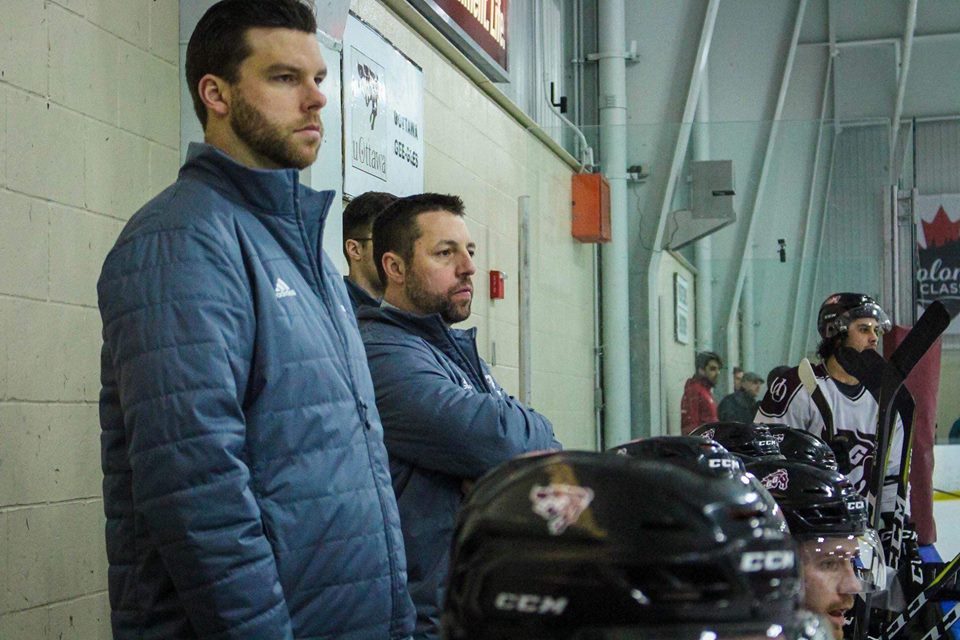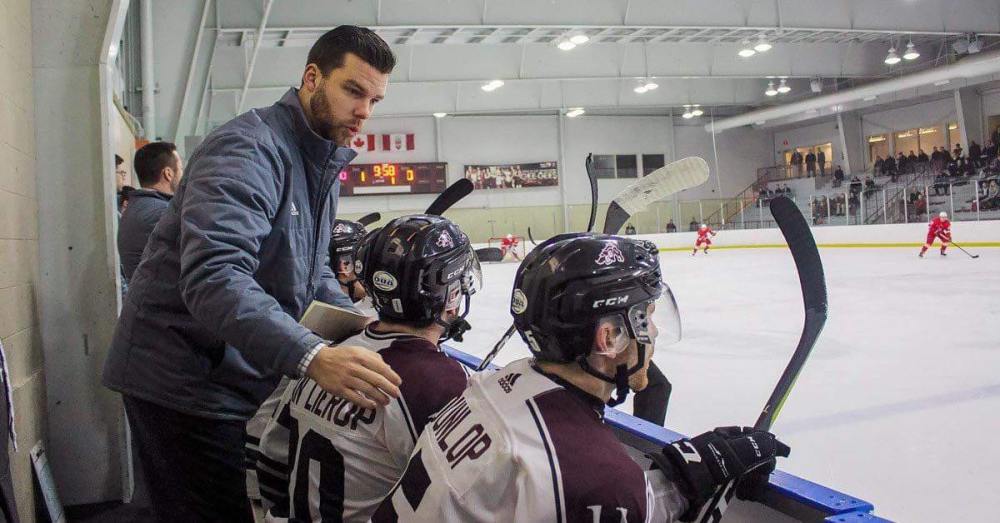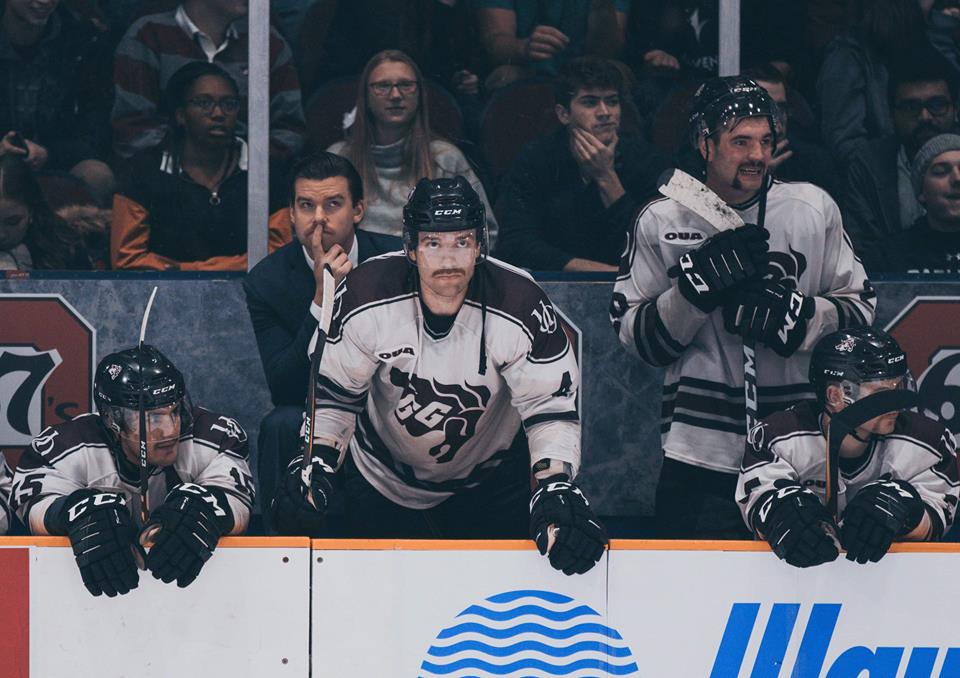
The end of this season, marks the seventh season that Brent Sullivan has held a coaching position for a hockey team.
“Retiring with concussion issues threw me right into the coaching world, and I’ll be going into my eighth season of coaching next year, my eighth season,” Sullivan said.
Before taking a coaching position over in Surrey, BC, Sullivan began his coaching career with the Sarnia Legionnaires, in Sarnia, Ontario.
Prior to coaching for the University of Ottawa (U of O) Gee-Gees men’s hockey team, Sullivan spent one year coaching over in Surrey.
“I had good opportunities to have some good conversations with Pat, I think in December and January, when I was coaching out in Surrey,” Sullivan said.
The U of O Gee-Gees men’s hockey team had gotten reinstated back into the Ontario University Athletics (OUA) league in 2016-17, and Sullivan made his way down to Ottawa, after talking with head coach Patrick Grandmaitre.
“I think it was an exciting opportunity to be able to be a part of a program building from scratch in your hometown, which doesn’t happen too, too often,” Sullivan said.
Another factor that drew him to the Gee-Gees; he felt a change in pace would do him good.
“It was something that I know I wanted to change what league’s I was coaching in, change the people I was coaching,” Sullivan said.
Sullivan is young. He is currently 29 years old, so, when he came in to the U of O, Sullivan was 26 years old.
“I was pretty young to be able to coach in university, but it was a good challenge, and it was a great opportunity, and its been a lot of fun, and I don’t regret that decision at all,” Sullivan said.
In the short span of three years, the Gee-Gees have made the playoffs since they’ve been back in the league.
In their first year back, the team finished in fifth place in the OUA East, and got eliminated by the Queen’s University Gaels, in three games in the first round of the Queen’s Cup Finals.
Last year, the team finished in fifth place in the OUA East, and moved on to the second round of the playoffs, after eliminating their cross-town rival, the Carleton University Ravens. The Gee-Gees then were eliminated by the McGill University Redmen in the second round.
This year, however, the Gee-Gees clinched the whole OUA, due to putting up 45 points to hold the best regular season record out of every team. They swept the Laurentian University Voyageurs in the first round of the playoffs, and then they got eliminated by the Gaels in the second round.
“Its been a lot of fun. Its been challenging at times, but at the same time, too, I think our program has done pretty well in its first three years, so, we still have a lot of room that we want to grow the program,” Sullivan said.
“But at the same time, I think that, you know, you look back three years from now, would we say we’re where we are right now. You know, back in 2016 I don’t think we would. So, we’re happy, but we’re not satisfied,” he added.
Over the years of being with the Gee-Gees, Sullivan can’t pick just one memorable moment, due to having too many memorable moments he has built up.
“I don’t think its necessarily a moment, but I think it’s a pretty cool thing what we’re doing here. So, I think just seeing the internal growth of our guys, and seeing the way the program has gone from three years ago when we had no idea what to predict,” Sullivan said.
“So, I think that we’ve done a good job here, and we’ve seen the program advance pretty quickly, so I think it’s a bucket of moments that are filling into it being a pretty fun run here with uOttawa,” he added.
“A good coach can change a game; a great coach can change a life,” John Wooden, the famous American basketball coach at UCLA said.
That is a quote that sits on top of a filing cabinet in Sullivan and Grandmaitre’s office, and, Sullivan hopes that that quote is having an impact on the Gee-Gees players through his and Grandmaitre’s coaching.
“I think that we have an opportunity here to grow with people for four to five years, so, the impact we can have on them is pretty immense, so, yes we want them to be good players, yes we want them to get better while they’re here,” Sullivan said.
“But at the end of the day, I think what we always talk about, is hopefully one of these guys calls us in 15 years and they’re running a business, or they’re successful, they’re happy, they have a family, and we know that we’ve had an impact on them in some of their most impactful years, so, I think it’s a crucial time in their lives, and we want to help guide them as best we can to helping them become good people,” he added.
Prior to his coaching career, Sullivan played on six teams over the course of 11 seasons.
Sullivan got started in the sport of hockey due to watching his older brother play with his team.
“When I was two, my brother’s two years older than me, so he would have been playing already,” Sullivan said.
As a child, Sullivan grew up in the countryside, in Carp, Ontario, just a half hour drive from the downtown core of Ottawa. His family home had a backyard pond, which Sullivan and his brother began skating on.
“We actually lived in the country, so we had a pond in our backyard that my brother and I skated on quite a bit,” Sullivan said.
Sullivan didn’t start playing organized hockey until the age of about four or five, but before that, he started skating with his brother’s hockey team.
“I was fortunate to get to go out with his team, and then, just thrust into the minor hockey rinks in West Carleton. So, from about the age of four and on I was in organized hockey, and I grew up playing it everyday,” Sullivan said.
After a couple of years, Sullivan’s brother moved on from hockey, due to other interests. However, when his brother did play, getting the chance to play on the pond with him and grow up to him, is a credit to how they pushed each other to be better.
“He stopped playing pretty young and moved on to other things, but at the same time too, you know, having a similar interest with your brother is always nice to have at home. I know he pushed me, and I probably pushed him pretty hard too, so, he definitely made me better when I was younger,” Sullivan said.
“But I know I grew pretty big pretty quick, so I think I was eight years old and I was already bigger than him, but it definitely helped,” he added.

At the age of 16, Sullivan moved out of his family home, as he began his junior hockey career with the Brockville Braves of the Canadian Junior Hockey League (CJHL).
Brockville would be the only full healthy season Sullivan experienced, as he began getting injuries and concussions in the next few years.
“Yeah, it’s my only memorable year. I was 16 there, I played for Todd Gill, I was fortunate that I had a really good year that year, I was the league rookie of the year, had an opportunity to get a full scholarship, which I chose to go to the OHL instead, but I think it was the last healthy year of hockey I had,” Sullivan said.
While in Brockville, Sullivan played in 72 games, while recording eight goals and 25 assists for 33 points.
“I had fun, I enjoyed it, there wasn’t too, too much pressure because it was a smaller market, which helps, but at the same time too I think there was enough to make it, it was starting to turn into a job rather than just a passion,” Sullivan said.
“I was doing it to hopefully make a career out of it at that point, but I was able to play some really good hockey for an entire year which is a positive,” he added.
Following his stint with the Braves, Sullivan made his way over to Sarnia, where he would end up playing for the Sarnia Sting of the Ontario Hockey League (OHL), for four seasons.
While on the Sting, Sullivan played in 128 games, while recording four goals and 30 assists for 34 points.
In the last half of the 2007-08 season, his first season on Sarnia, Sullivan mentioned how that first year was a year where he didn’t play much due to so many veterans being on the team.
“So, I was 17 my first year when I played there, I was on a good team, so I didn’t get to play a lot as a young guy, which was fine, it was a good opportunity for me to learn the league and learn the ropes,” Sullivan said.
“But we were on a team with guys like Mark Katic, Jordan Hill, Ryan Wilson, Steve Whitely, Dalton Prout, a bunch of guys who have gone on to play in the higher ranks, which, as a young guy, it was great to learn from them,” he added.
His second season with Sarnia, however, was when the concussions started coming.
“Year two was when I really started to get hit with the concussion bug. I got three that year just from playing the game the wrong way. I was trying to play tough, trying to play physical, I was fighting and it just wasn’t the best for me, but I think that was when I started to be more comfortable in Sarnia,” Sullivan said.
In his third year on the Sting, Sullivan recorded 17 points, the highest number of points he recorded with them. On defence that season, he was paired up with Nathan Chiarlitti, who is currently working with the Gee-Gees men’s hockey program as an assistant coach.
“Year three I ended up playing pretty well, and I played a lot with Nathan that year, as well as Jordan Hill who was our captain at the time, and then got hit again with a pretty bad concussion at the end of the season,” Sullivan said.
In his fourth and final year with Sarnia, Sullivan’s concussion issues continued to get worse, and, after having played in 32 games that season, he got traded over to the Windsor Spitfires.
“And then when year four came around, I was just trying to hang on at that point because of all of the concussions. You know, I didn’t have much left in me, so it wasn’t the most memorable last season,” Sullivan said.
“But I got to play with a lot of great people, I think playing with Nathan was a lot of fun because he was also my best friend, which was a lot of fun to play with your best friend every day, but at the same time he and I always joke around that we were best friends off the ice, but horrible partners. We weren’t very good together,” he added.
Following his time with Sarnia, Sullivan spent a short time with the Spitfires, before taking a year off of hockey in the 2011-12 season, in order to rest and heal from his concussions.
The following season, Sullivan suited up for two games for the Ravens, but ended up retiring, after a blindsided hit that resulted in yet another concussion.
Like many hockey players, Sullivan has faced many challenges and adversities to get him to the person he is today.
“In all honesty, a lot of my challenges come from having to battle back from injuries, I think that the injuries made me not as good a player as I was when I was younger. So, you can say the under achieving thing was pretty disappointing in myself, because I was supposed to be good and I ended up not being that great,” Sullivan said.
“So, I would have loved to carve out a playing career, but the injuries curtailed out any kind of possibility of that happening,” he added.
Despite the multiple injuries and concussions, Sullivan believes, by being able to play in the OHL and have those memories, he is a more mature person.
“I think playing in the OHL makes you mature a lot quicker than others. Just because you’re thrust into more of a role model role, and you’re having opportunities to do interviews, and media, and you’re doing signings in the community, and you’re forced to grow up quick,” Sullivan said.
“So, I think that’s impacted me, because I’ve had the opportunity to mature at a pretty young age. I think it’s also given me an opportunity to meet a lot of good people, and learn from a lot of good people. So, the personal development, as a person, player, coach, I wouldn’t have gotten without the game, so, it’s given me a lot of opportunity to mature and grow into what I like to think as a pretty good human,” he added.

Despite his concussion issues being some of the hardest times of his life, Sullivan believes the understanding of how impactful concussions are, is changing to a better understanding.
“The hardest thing I’ve ever been through. I think the mental battle was something that will always go on, the physical battle was tough, but its not, there’s no cast, there’s no pain, right, so regardless of you getting headaches, you can also get headaches if you don’t drink enough water, or you read too long, so, I think it was always tough on the physical side of things to know when you were ready or not to start trying again,” Sullivan said about the physical side of dealing with multiple concussions.
“But the mental battle will be there for years. I think that that’s something that’s just extremely draining on people, and I know that concussions are becoming more frequent conversation now, but I still think we’re a ways away from truly understanding the impacts that they have, and so, still a battle,” he added.
As for the future in concussions, Sullivan believes that the leagues are cracking down on limited the conditions in a player suffering a concussion, but he also believes that it’s the players who need to police it if they truly want things to change.
“I think it’s doing a good job. In all honesty, I think it is, it’s a hard thing. It’s such a fast game, it’s played with such speed and pace that you’re going to have collisions. I think what they’re doing, is they’re doing a good job of limiting those conditions that are avoidable, and I think that there’s more of a respect now for players when it comes to their brains, comes to their head injuries, and you just respect your opponents a little more,” Sullivan said.
“So, I think it’s done a good job in the last little while of respecting that side of things. I don’t know if we’ll ever get to a point where its squeaky clean, I don’t think it will, because then you’re going to remove the grace of the game and the speed and the pace and the physicality which makes the game what it is.
I think it’s going to have to come from the players and the internal respect to not hit a player who’s in a tough position. Or, fighting has a part in the game, I don’t think it has as big a part as some would think, I think it’s getting removed slowly as well, so, I think the players are the ones who have to personally police it, but I think it’s doing a good job,” he added.
In regards to his own future, Sullivan has said that he doesn’t know what he’ll do, but he hopes to keep having success with the Gee-Gees program.
“I don’t have any long-term plans, to be honest with you. I’m trying to stay in the moment, but I think right now it’s to help this program win, and I think we’ve done a good year here, so, to win with this program is the first thing on my mind,” Sullivan said.
As for the future of the Gee-Gees program, if you’re interested in joining a university hockey team, and interested in going down to student-athlete road, Sullivan has said being a part of a university hockey team is a special thing.
“People always say that junior hockey is the best time in your life, university players will tell you that university hockey is the best time in your life. You get to grow with a team, you get to grow with teammates, being a part of a university and a culture is a really special thing. I think that you have an opportunity to be a part of something bigger than just being a hockey player. You’re a part of a 40,000 plus student school, so each time you put the jersey on, we represent them and it’s a pretty special thing,” Sullivan said.
“So, for those thinking about being a student athlete, I would highly recommend, and don’t waste those years either. Make sure you leave with that piece of paper,” he added.